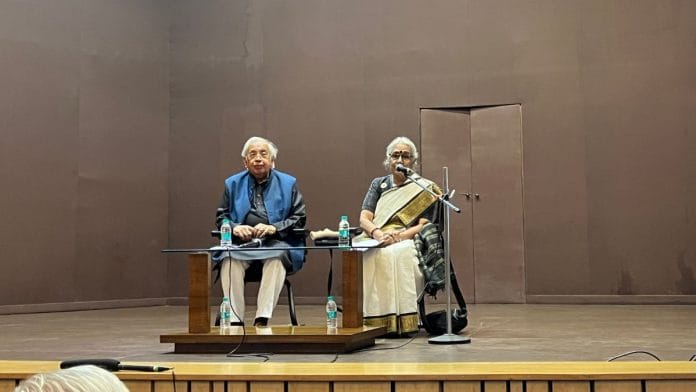New Delhi: Ramon Magsaysay Award winner and Mazdoor Kisan Shakti Sangathan founder Aruna Roy didn’t read a book for seven years while she lived in rural Rajasthan. It was unjust –– how could she be buying books when people didn’t have food to eat? After she met a woman on a bus excitedly going to buy jewellery, she gave way to a single indulgence — a stack of books by her bed.
“As an activist, literature has taken a backseat. But in critical times it’s always come back to me,” she said. “There’s no linearity in my reading, or in my thoughts and actions. You read so much that you don’t realise it.”
Roy was speaking at the debut session of a lecture series titled ‘Literature Matters’ by Hindi writer and cultural czar Ashok Vajpeyi’s Raza Foundation, in which non-literary characters speak of the hold writers and texts have had over their lives –– despite belonging to ostensibly literature-free realms.
Roy is known for being wedded to issues of the marginalised and for bringing the RTI Act to life. Whereas reading, in its non-academic form, is seen as highfalutin and frivolous, and as a non-political act of pleasure. Through her conversation with Vajpeyi, Roy managed to subvert this image. The books that have taken up residence in mind returned to her at the most unexpected of times.
Roy’s feminism has been shaped by British writer Virginia Woolf, her ownership of stream-of-consciousness writing, and her preoccupation with the inner lives of women.
Roy once had to work with a politician whom she described as being “extremely crude and offensive to women.” She didn’t want to meet him, didn’t even want to be in his line of vision. But it was necessary. And that’s when Jane Austen came to her rescue. This politician became Roy’s version of two Pride and Prejudice characters, Mrs Bennet and Mr Collins –– he morphed into her personal object of ridicule.
“I started to see him not as evil, but as a caricature. And I got through the day,” Roy said. “I haven’t said this to anyone before but it’s true. Jane Austen made me see the ridiculous.”
Also read: ‘Ambedkar would’ve been called rightist now’—Opening remarks at launch of book on Indian Right
Passion and menace
In the beginning of the lecture, the writers and texts that Roy has been influenced by were displayed on a screen. The list is staggering –– Niccolo Machiavelli, the Mahabharata and the Ramayana, and Socrates find their place amid Indian contemporary writers like Amitav Ghosh and Arundhati Roy.
“You read literature and you realise you have so much in common [with writers],” said Roy. “These are people who articulated our ideas so much better than we did.”
Roy discovered a kinship between herself and the writers she read. She identified with Salman Rushdie, his work echoing within her. The politics that framed her generation was located in the books written by the authors who represented it.
Although Rushdie and Amitav Ghosh are writers who belong to a specific demographic, they are a great distance away from the field work and issues that occupy Roy. And in response, she highlighted the importance of engaging with local literature, fables, and folklore.
“The best way to enter a community is through its culture,” Roy said, before thanking writers like Rajasthani stalwart Vijaydan Detha for transforming a Tamil literature student and IAS officer into a “true Rajasthani.”
The books Roy reads aren’t necessarily serious or what would be considered high-fiction. She reads a lot of detective fiction and PD Wodehouse. Her home is overflowing with generations of books –– which she described as both “a passion and a menace.” As Roy grows older, they’re going to insulate her from the perils of old age, as she makes her way through a library shaped by multiple generations of her family.
“Old age is not formidable. I just shouldn’t lose my eyesight,” she said.
The audience consisted mostly of those of Roy’s generation, except for a handful of fans. They complained about the unwillingness of children and grandchildren to read — purportedly the product of a changing “value system.”
This was rubbished by Vajpeyi, who spoke of the queues to enter Paris’ famous Shakespeare and Company bookstore, and the thousands of books that are being published yearly.
(Edited by Aamaan Alam Khan)







Ashok Vajpeyi has been a lifelong beneficiary of the Congress-Left largesse. He owes his career and accolades to the political patronage from the Left-liberal cabal.
His daughter, Ananya Vajpeyi, is a leader of the Left-liberal cabal nowadays. Having secured degrees from top Western universities (her father had the required connections), she is a leading “critic” of the “fascist” Modi regime. To burnish her secular credentials, she even got married to a Muslim.
The father-daughter duo, beneficiaries of Left-liberal patronage during the Congress era, are living a lavish life – all the while condemning, mocking and ridiculing the average Indian for voting for the Hindu nationalist political parties.